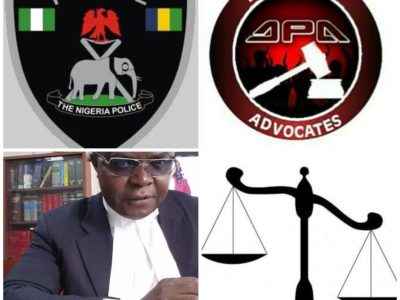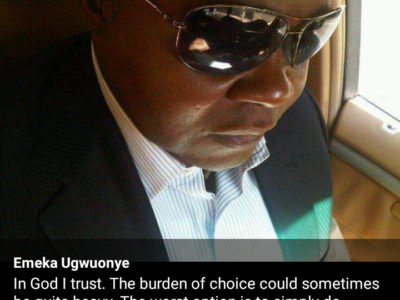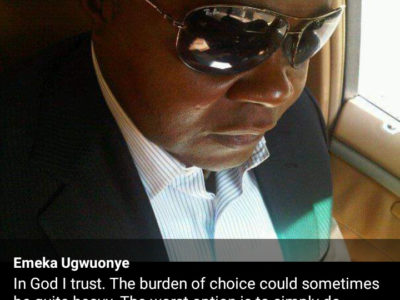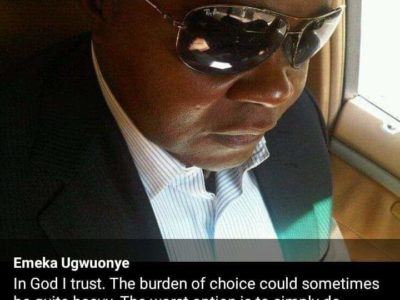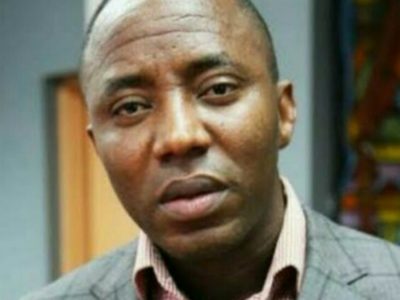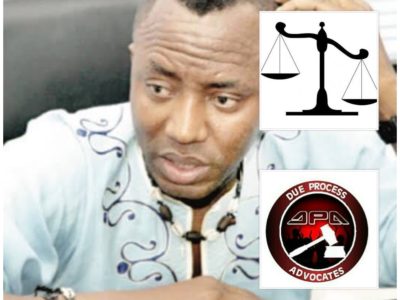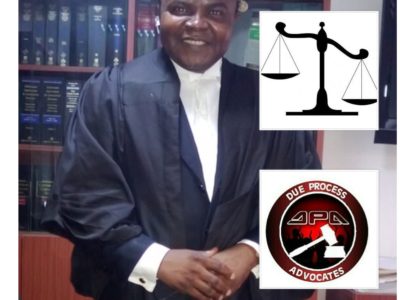EMEKA UGWUONYE: OUTCOME OF COURT TODAY.
FOR DPA MEMBERS ONLY: STRATEGIC UNDERSTANDING OF EMEKA UGWUONYE’S CASE.
POOR OSINBAJO, YOU’RE SO RIGHT
The Vision of Emeka Ugwuonye Through DPA
After many years of active and diversified experience in America, Emeka Ugwuonye understood the direction of change in many different spheres of human endeavors.
Looking at legal services, for one, he could see that a few years from now, the current way of doing business will need to change radically. The idea that an ordinary person would wait until he is in trouble before he would then dress up, go to the office of the lawyer, sit on his upholstery to narrate his problems to the lawyer; such idea will be too outdated and archaic. The idea that a person needs to be rich before he will be able to receive justice under the law will be too harsh and too unjust for a modern society. For Emeka Ugwuonye, he envisioned justice becoming like oxygen. You don't need to be rich to breath oxygen. You only need to be wise enough to stay away from a polluted spot.
Emeka Ugwuonye's mind was no different from other graduates of Harvard of the 90s. The internet had just been introduced for civilian use. Ten years after graduation, it was obvious to him the impact of the digital revolution. As a lawyer, he was focused on how new technologies were changing the service sector he was most familiar with, which is the legal sector. In 2007, he spoke in a bar function in Washington DC about internet based interactive legal research modules. Based on that concept, he contemplated an online legal services firm. The project was shelved because it would require several million dollars to get it off the ground.
As a Nigerian, Emeka believed in the opportunity of using his knowledge and experience to effect positive changes in Nigeria. A country of 200 million people, which is quite poor and behind in many areas, has tremendous opportunities for growth and development. With this in mind, Emeka would focus his attention on Nigeria. He has never regretted his decisions, despite any challenges.
But a straight profit driven venture did not appeal to Emeka. He needed a hybrid concept whereby he could create free public good through a commercially viable operation. DPA presented the best opportunity.
Through DPA, we have been able to ensure that an ordinary person can afford quality legal services in his moments of need. Through DPA, we have been able to ensure that access to justice has been broadened to reach more people who were previously shut out. Through DPA, a person in need of legal service is able to get quality intervention from a lawyer he is just meeting for the first time, like what is happening this morning in Benin City. (A lady summoned to a police station will meet her lawyer for the first time a few minutes before the meeting. But the lawyer will have extensive information about her and her case and she will know a lot about the lawyer. And money will not be discussed between her and the lawyer. Also, she will not be worrying whether the law is competent or not. DPA made all that possible). Through DPA, we have been able to create critical legal awareness through free legal education offered on our platforms. We can do any of these things much better.
Beyond our present levels of achievement in DPA, we see vast opportunities ahead. Through the DPA integrity venture, we are going to float integrity evaluation platforms, which will help solve one of the greatest problems in Nigeria today, which is that it is impossible to believe anything good a Nigerian tells you about himself or herself. Our integrity platform will make it very easy for you to confirm a person's resume in minutes, whether you are evaluating the person as a lover, or as an employee or as a tenant.
Indeed, DPA has lined up various ventures that leverage well with its structures. These ventures touch on sectors like the media, education, health, marketing and distribution, financial services, logistics and hospitality, emergency response system, etc.
Members of the DPA community must be aware that joining DPA is about the best decision they have made. The easy entry point into DPA is by joining the forum as a forum member. That's free of charge. Your DPA experience widens as you become a registered member.
DPA has an incredibly bright future, not just as a name, but as a bundle of ideas and concepts. We want you to be part of the revolution.
The Vision of Emeka Ugwuonye Through DPA
After many years of active and diversified experience in America, Emeka Ugwuonye understood the direction of change in many different spheres of human endeavors.
Looking at legal services, for one, he could see that a few years from now, the current way of doing business will need to change radically. The idea that an ordinary person would wait until he is in trouble before he would then dress up, go to the office of the lawyer, sit on his upholstery to narrate his problems to the lawyer; such idea will be too outdated and archaic. The idea that a person needs to be rich before he will be able to receive justice under the law will be too harsh and too unjust for a modern society. For Emeka Ugwuonye, he envisioned justice becoming like oxygen. You don't need to be rich to breath oxygen. You only need to be wise enough to stay away from a polluted spot.
Emeka Ugwuonye's mind was no different from other graduates of Harvard of the 90s. The internet had just been introduced for civilian use. Ten years after graduation, it was obvious to him the impact of the digital revolution. As a lawyer, he was focused on how new technologies were changing the service sector he was most familiar with, which is the legal sector. In 2007, he spoke in a bar function in Washington DC about internet based interactive legal research modules. Based on that concept, he contemplated an online legal services firm. The project was shelved because it would require several million dollars to get it off the ground.
As a Nigerian, Emeka believed in the opportunity of using his knowledge and experience to effect positive changes in Nigeria. A country of 200 million people, which is quite poor and behind in many areas, has tremendous opportunities for growth and development. With this in mind, Emeka would focus his attention on Nigeria. He has never regretted his decisions, despite any challenges.
But a straight profit driven venture did not appeal to Emeka. He needed a hybrid concept whereby he could create free public good through a commercially viable operation. DPA presented the best opportunity.
Through DPA, we have been able to ensure that an ordinary person can afford quality legal services in his moments of need. Through DPA, we have been able to ensure that access to justice has been broadened to reach more people who were previously shut out. Through DPA, a person in need of legal service is able to get quality intervention from a lawyer he is just meeting for the first time, like what is happening this morning in Benin City. (A lady summoned to a police station will meet her lawyer for the first time a few minutes before the meeting. But the lawyer will have extensive information about her and her case and she will know a lot about the lawyer. And money will not be discussed between her and the lawyer. Also, she will not be worrying whether the law is competent or not. DPA made all that possible). Through DPA, we have been able to create critical legal awareness through free legal education offered on our platforms. We can do any of these things much better.
Beyond our present levels of achievement in DPA, we see vast opportunities ahead. Through the DPA integrity venture, we are going to float integrity evaluation platforms, which will help solve one of the greatest problems in Nigeria today, which is that it is impossible to believe anything good a Nigerian tells you about himself or herself. Our integrity platform will make it very easy for you to confirm a person's resume in minutes, whether you are evaluating the person as a lover, or as an employee or as a tenant.
Indeed, DPA has lined up various ventures that leverage well with its structures. These ventures touch on sectors like the media, education, health, marketing and distribution, financial services, logistics and hospitality, emergency response system, etc.
Members of the DPA community must be aware that joining DPA is about the best decision they have made. The easy entry point into DPA is by joining the forum as a forum member. That's free of charge. Your DPA experience widens as you become a registered member.
DPA has an incredibly bright future, not just as a name, but as a bundle of ideas and concepts. We want you to be part of the revolution.
DPA Policy Statement for October 2019
How Nigerians fight in the social media over Emeka Ugwuonye
What to expect today on Sowore’s case
DPA RAMBO PREDICTED THAT DSS WOULD NOT RELEASE SOWORE.
But all that changed few hours after Justice Taiwo granted bail to Sowore. He ought to have been released once the terns and conditions set by the court were met. That was what DSS needed to maintain the appearance that it acted within the law. Having failed to maintain that appearance of compliance with law, DSS has come under increasing criticism, and rightly so. At the same time, Sowore appears more like a victim of state-sponsored persecution, and rightly so, too.
The story now is how DSS failed to comply with court order. That takes away any merits in their case against Sowore. Many knowledgeable people are now asking why such blunders by DSS. Why not arraign Sowore before the expiration of the 45 days granted to them to detain him? Alternatively, why didn't they apply for two weeks extension of the 45 days, which would easily have been granted to them? Alternatively, why not release him and arraign him when you are ready since his lawyer has undertaken to produce him for arraignment? Any of these would have been better than the option DSS have chose to follow. It is believed that some people within the DSS deliberately screwed up their strategy.
Anyway, we believe that DSS is just trying to get a date in court to arraign Sowore. But they were never to play that game and with everyday that passes without them either arraigning Sowore or releasing him, they run out of any moral maneuverable room left. We believe that DSS still won't release him. They want to keep him till he is arraigned. But if DSS don't arraign Sowore today, Friday, September 27, and do not release him either, then DSS has lost the game.
Our best guess is that Sowore will be arraigned today and be remanded in prison today. We don't foresee any alternative to this. Our analysis of the history and psychology of DSS leaders leads us to believe that Sowore's lawyer's decision to initiate a contempt proceedings against DSS will push them into a fierce resistance up to the point of thumbing their noses at the courts. Though that will be unfortunate, that is a reality suggested by a close study of the history of DSS.
.


